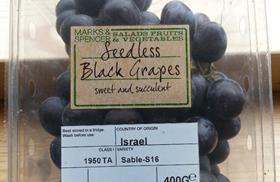
Israel’s table grape exports have declined considerably over the past decade, from around 7,000 tonnes in 2006 to a predicted level of between 2,500 and 2,800 tonnes this season.
However, according to some of the country’s leading table grape marketers, demand on the internal market is increasing year on year and bolstering prices as a result.
With production of table grapes in Israel now spread across around 3,000ha – with about 15 per cent of those vineyards planted with early-harvesting varieties in the Jordan Valley – the country’s overall yield is expected to be somewhere between 50,000 and 60,000 tonnes in 2015. Exports therefore make up just a small portion of the total.
One of Israel’s foremost international fruit traders, Galilee Export, leads the pack on grapes and is set to ship more than 1,000 tonnes to foreign customers this year – almost all of it the Early Sweet variety exported mainly to Europe and Russia.
Expectations in Israel are for a positive start to the season due to a shortage of volumes from India and Chile.
Eitan Zvi, Galilee’s marketing manager, says Dan Ben Hannah (DBH), an attractive, early black seeded cultivar with round, medium-sized, red-black berries, is set to feature more prominently following its recent addition to the company’s export portfolio.
Developed in Israel, it was selected from a cross between Black Mikveh and Alphonse Lavallée. “We expect to export also a light volume (a few containers) of DBH and probably a single container of Flame Seedless.”
Israel’s new grape talisman
Israel’s major producer, mainly for local consumption but with a significant export programme, is Tali Grapes (Invei Tali). Operated until recently by Dudu Ivri, the supplier has over the past ten years managed to create one of the country’s most popular fresh produce brands.
With a number of varieties licensed from US group Sun World, Tali produces and markets a range of table grapes including Crimson, Superior, Thompson and Red Globe, as well as the black seedless variety Sable, which it is sending to UK retailer M&S in July.
A red seedless variety, Scarlotta, meanwhile, will be available from November.
Tali’s exports also reach the Far East – mainly Red Globe – and have also, more recently, been sold to customers in Africa.
Import scene
In the meantime, the Israeli market for imported table grapes is said to be growing as a result of a recent relaxation of import restrictions.
The main player when it comes to importing off-season grapes from South Africa is Gil Givoni, chief executive of Aviv Fruit.
Starting in the mid-1990s, Givoni was faced with a dual counter-claim in trying to obtain the obligatory import licences: firstly, he was told imports would damage local producers; and, secondly, critics pointed to the alleged inherent phytosanitary dangers of exposing Israeli agriculture to new pests and diseases.
But having proved that the effect on local producers during their off season would be minimal, and having received all of the required phytosanitary clearances from source, the final major barrier Givoni faced was the creation of an import tax.
Set initially at a very high 40 per cent, this is now less than half that level. Despite the high costs and severe headaches suffered, Givoni claims it has been worthwhile a pursuit as it exposes Israeli consumers to a wider choice of fruit over a longer period of the year.



